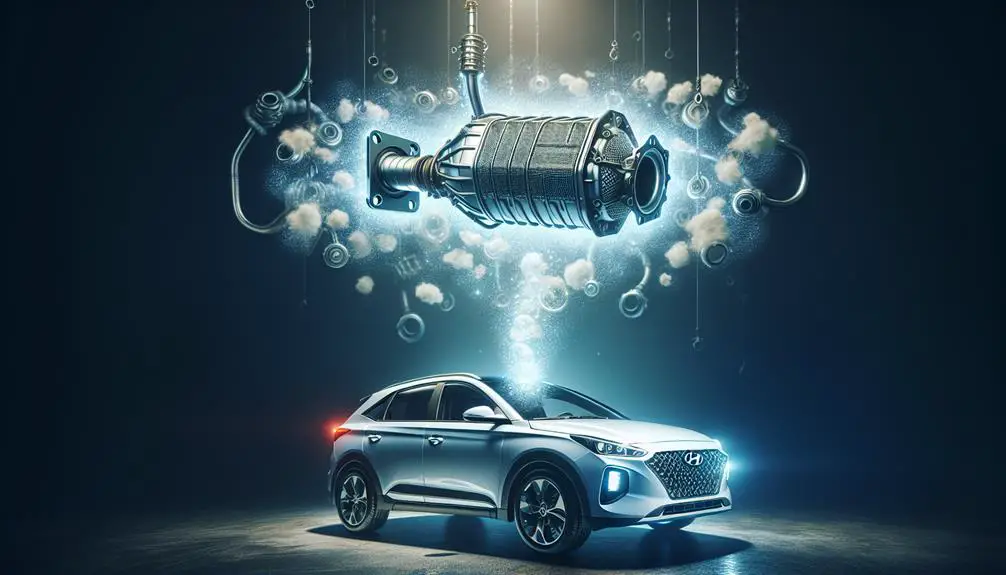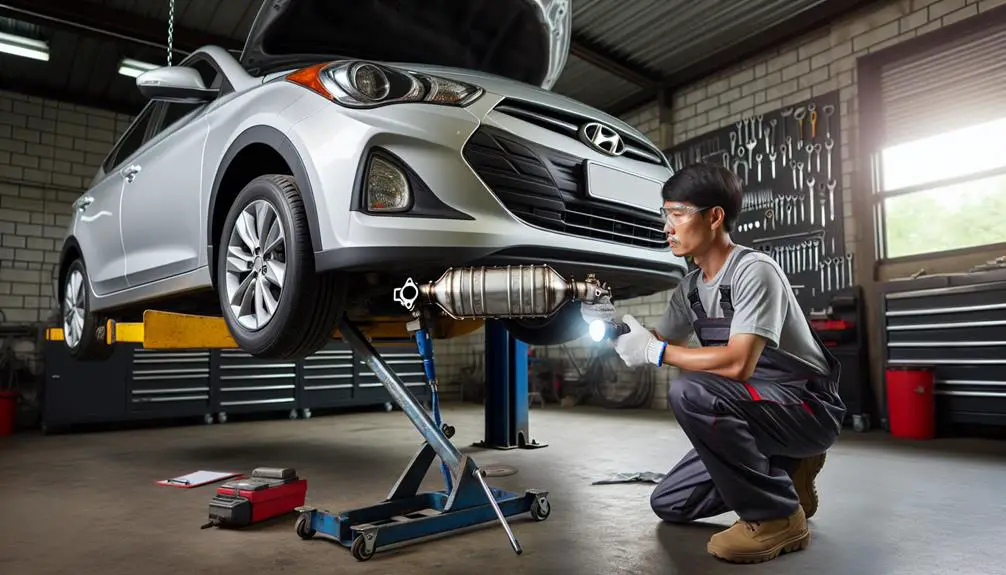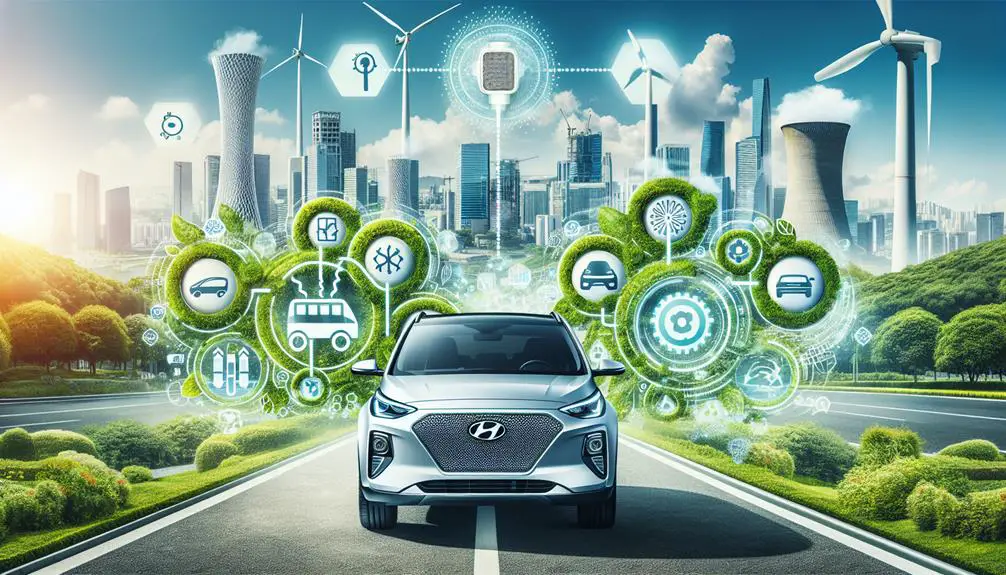Yes, Hyundai vehicles are equipped with catalytic converters.
In the age of steam engines, questioning whether Hyundai vehicles come equipped with catalytic converters might seem out of place, but it's a query you'd do well to ponder.
As you navigate the eco-friendly initiatives of Hyundai, you'll find that grasping the role of catalytic converters in their lineup is vital. These devices are pivotal in reducing emissions, making them a key component in Hyundai's commitment to environmental sustainability.
While the basics might seem straightforward, the maintenance, common issues, and future developments surrounding Hyundai's catalytic converters offer a complex landscape. Stick around to uncover how these components shape your vehicle's performance and Hyundai's eco-friendly endeavors.
Understanding Catalytic Converters

Catalytic converters play an essential role in your car's exhaust system by reducing harmful emissions. They're vital for keeping the air cleaner and meeting environmental regulations. You might wonder how they fit into your Hyundai's functioning. Well, they sit between the engine and the tailpipe, working silently yet efficiently.
Here's how it works: your car produces exhaust gases that could pollute the air. The catalytic converter, filled with metals like platinum, palladium, and rhodium, acts as a catalyst. When these gases pass through, a chemical reaction occurs, transforming the toxic gases into less harmful substances like carbon dioxide and water vapor before they exit your car.
You've got to keep an eye on it, though. A failing catalytic converter can lead to decreased performance and increased emissions. Signs include a decrease in fuel efficiency, a sulfur smell, or a check engine light. Regular maintenance is crucial to ensure it's functioning correctly.
Hyundai's Eco-Friendly Initiatives
Appreciating the significance of catalytic converters in decreasing emissions leads us naturally to Hyundai's initiatives in advancing eco-friendly technologies. You're already aware that Hyundai is a global automotive leader, but did you know they're at the forefront of eco-friendly vehicle technology? They're not just about making cars; they're about making a difference.
Here's a quick look at some of Hyundai's eco-friendly initiatives that are reshaping the automotive landscape:
- Hyundai's commitment to electric vehicles (EVs): They're aggressively expanding their lineup of electric models, aiming for a more sustainable future.
- Hydrogen fuel cell technology: Hyundai is a pioneer in developing hydrogen fuel cell vehicles, which emit only water vapor and represent a significant leap toward reducing automotive emissions.
- Eco-friendly manufacturing: They've implemented green manufacturing practices, including using renewable energy and recycling materials, to minimize environmental impact.
- Investment in renewable energy: Hyundai is investing in renewable energy sources like wind and solar to power their operations, further reducing their carbon footprint.
Hyundai's approach isn't just about meeting regulations; it's about leading by example. They're dedicated to developing technologies that not only improve your driving experience but protect our planet for future generations.
Maintenance Tips for Hyundai Converters

To keep your Hyundai's emissions low and performance high, regular maintenance of its catalytic converter is necessary. Ensuring its efficiency is not just about following regulations; it's about taking care of the environment and guaranteeing your vehicle runs smoothly for years to come. Here's a compact guide to help you maintain your Hyundai's converter effectively:
| Maintenance Tip | Why It Matters |
|---|---|
| Regularly check for leaks | Leaks can lead to engine performance issues and increased emissions. |
| Guarantee timely oil changes | Clean oil prevents contaminants from harming the converter's efficiency. |
| Use the correct fuel type | The wrong fuel can damage the converter and affect its ability to reduce emissions. |
| Inspect for clogs or damage | A clogged converter can lead to reduced engine performance and higher fuel consumption. |
| Listen for unusual noises | Rattling noises may indicate a failing converter, needing immediate attention. |
Common Issues and Solutions
Hyundai owners often face several common issues with their catalytic converters, but there are simple solutions to these problems. Grasping these issues can help you address them promptly, ensuring your vehicle remains efficient and environmentally friendly. Here's a closer look at what you might encounter and how you can solve these issues:
- Clogging: Over time, your catalytic converter may become blocked with debris. Regular inspections and cleaning can prevent this, ensuring your converter operates efficiently.
- Overheating: If your converter overheats, it's often because of an issue with the fuel mixture. Ensuring your engine is properly tuned and the fuel mixture is correct can lessen this problem.
- Rattling Noises: A rattling sound may indicate that the internal structure of the converter is damaged. This usually requires replacing the unit, but it's a relatively simple process.
- Check Engine Light: If your check engine light comes on and diagnostics indicate it's related to the catalytic converter, it could be a sensor issue or a sign of a more significant problem. Proper diagnostics can pinpoint the cause, and solutions range from sensor replacement to more detailed repairs.
Future of Emission Control in Hyundai

Grasping these common catalytic converter issues sets the stage for exploring how Hyundai is pushing the boundaries of emission control technology into the future. You're witnessing a pivotal time where Hyundai isn't just fixing problems but innovating solutions. They're investing in state-of-the-art research and development to make their vehicles not only comply with but exceed global emissions standards.
Hyundai's future plans include enhancing the efficiency of their catalytic converters, making them more resistant to common issues like clogging and poisoning. You'll see them integrating advanced materials that can withstand higher temperatures and reduce the likelihood of failure. Furthermore, Hyundai is diving deep into hybrid and electric vehicle technologies, aiming to reduce reliance on traditional combustion engines, which are the primary source of vehicle emissions.
You're also about to see Hyundai's commitment to renewable energy sources take center stage. They're exploring how hydrogen fuel cell technology can play a vital role in powering future vehicles with zero emissions. This approach not only addresses the emissions from the vehicles themselves but also considers the entire lifecycle of the vehicle, from production to disposal, ensuring a greener future for everyone.
Conclusion
In summary, your Hyundai definitely comes equipped with a catalytic converter, a key component in reducing emissions and keeping the air cleaner. Embracing Hyundai's eco-friendly initiatives, you've got a role in maintaining this essential part of your vehicle.
By staying on top of maintenance and addressing common issues promptly, you're not just ensuring a smoother ride but contributing to a greener planet.
With Hyundai's ongoing innovations, the future of emission control looks promising, and you're part of that progress.
